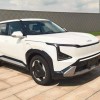
Can You Drive an EV In A Thunderstorm?
There is all kinds of confusion, misconceptions, and outright wrong information surrounding EVs. Whether it be about battery longevity, charging logistics, or pricing, there’s no shortage of misinformation circulating about EVs. One of the more curious questions that comes up from time to time, though, is whether it’s safe to drive an EV during a thunderstorm.
Is driving an electric car in a lightning storm dangerous?

It’s laughable to think that a modern car for the masses wouldn’t be safe in inclement weather for most. However, some folks can’t get past the idea that water and electricity don’t mix. So, with that logic, it’s easy to see where they’re coming from in thinking EVs in a thunderstorm could be dangerous. Thankfully, that is not the case.
Get Green Now clarifies that electric vehicle battery cells are not open to the elements. This is because EV manufacturers very intentionally put them in waterproof sealed containers on the vehicle. As with any other car, the concept of using it every day remains a goal despite it using electric power.
Many concerns about water damage come from the fact that many electric vehicles have their batteries close to the ground. This is the case with Tesla EVs as well as the Porsche Taycan, Audi E-Tron GT, Chevrolet Bolt, and virtually every other modern EV. However, because of the insulation surrounding the battery, there is no risk of water damage to the electric components from driving in heavy rain. Unless, of course, the battery pack has somehow been damaged and exposed to the elements.

The protection of the battery in an EV is remarkably tough. So, to cause enough damage for it to be exposed to water, you’d likely have to total the car to an undrivable point anyway.
In fact, electric vehicles are so optimized for use in bad weather that even the charging systems are sealed and weatherproof. So, if your next question is about the safety of charging an electric vehicle in the rain, great news! Engineers also thought of that! It is, indeed, perfectly safe.
What happens if lightning strikes an EV?
Perhaps, though, the concern lies in a lightning strike while driving an electric car. Lightning striking you while driving is woefully unlikely. However, you’re not any less safe in an EV during a lightning storm than you are in any other car.
Like any other metal vehicle, an EV creates a Faraday cage around its occupants. Effectively, if lightning strikes your vehicle, the electricity transfers through the metal body to the tires and then into the ground. According to the National Weather Service, damage to electrical components is common after lightning strikes in all vehicles. So, no matter what you’re driving, if lightning strikes your car, it’s not likely to end well for the vehicle.
Overall, to put a simple answer to the question, yes. It is indeed safe to drive an electric vehicle in a thunderstorm. Furthermore, it’s safe to drive them through puddles, snow, and all other weather scenarios you’d drive a gasoline car through.



